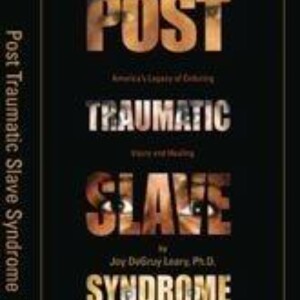
Tuesday Jun 10, 2025
Post Traumatic Slave Syndrome: An Engaging Audio Summary of Joy DeGruy Leary's Insights
1 What's Post Traumatic Slave Syndrome
"Post Traumatic Slave Syndrome" by Joy DeGruy Leary explores the lasting psychological and emotional impacts of slavery on African Americans and how these historical traumas have been passed down through generations. The book argues that the effects of systemic racism and the legacy of slavery create a cycle of trauma that manifests in various forms, including mental health issues, behavioral problems, and socio-economic challenges. DeGruy presents a framework for understanding these phenomena and emphasizes the importance of healing and education to break the cycle, advocating for a deeper recognition of historical injustices and their contemporary implications.
2 Key Concepts of Post Traumatic Slave Syndrome
In "Post Traumatic Slave Syndrome," Dr. Joy DeGruy explores the lasting impact of slavery on African American culture and identity. The theme introduced in Chapter 1 revolves around the psychological trauma and behavioral manifestations stemming from historical oppression. Subsequent chapters that relate to this theme include Chapter 2, which delves into the historical context of slavery and its effects on family structures, and Chapter 4, which examines the intergenerational transmission of trauma and how it manifests in contemporary behavior and relationships within African American communities. These chapters build on the foundational concepts of trauma and resilience introduced in the first chapter, illustrating the deep-rooted and complex legacy of slavery.
3 In-Depth Chapter Analysis of Post Traumatic Slave Syndrome by Joy DeGruy Leary
In "Post Traumatic Slave Syndrome," Joy DeGruy Leary explores the historical and psychological impacts of slavery on African American communities through several distinct chapters. One key chapter is Chapter 3, where she delves into the concept of "historical trauma," illustrating how the collective experiences of slavery, segregation, and discrimination have resulted in deep-seated psychological effects that persist across generations. For example, Leary details how the trauma of enslavement has influenced modern behaviors and societal roles, creating what she identifies as a cycle of damage that manifests in issues such as low self-esteem, community disconnection, and internalized oppression. This chapter underscores the theme of the long-lasting repercussions of slavery and sets the groundwork for understanding the need for healing and reclamation of identity.
Another pivotal chapter is Chapter 7, which focuses on resilience and the potential for healing within African American communities. Leary emphasizes the strength and endurance of Black culture, highlighting examples of community leaders and initiatives that aim to promote mental health and well-being. For instance, she discusses the role of cultural pride and family connections in fostering resilience, illustrating how these elements serve as coping mechanisms against the backdrop of historical trauma. By showcasing both the painful legacy of systemic oppression and the empowering strategies for overcoming it, this chapter reinforces the overarching theme of survival and recovery, demonstrating that despite the generational scars of slavery, there exists a path toward healing and strength in community solidarity.
Book Summary Audio Bookey https://www.bookey.app/audiobook/post-traumatic-slave-syndrome
Youtube https://www.youtube.com/watch?v=Rorgjdvphek
Amazon https://www.amazon.com/Post-Traumatic-Slave-Syndrome-Americas/dp/0963401122
Goodreads https://www.goodreads.com/book/show/432113
No comments yet. Be the first to say something!